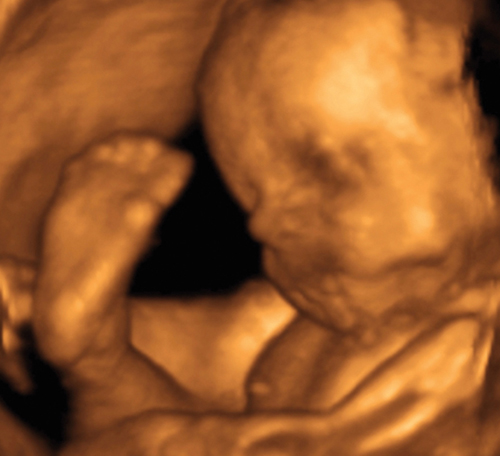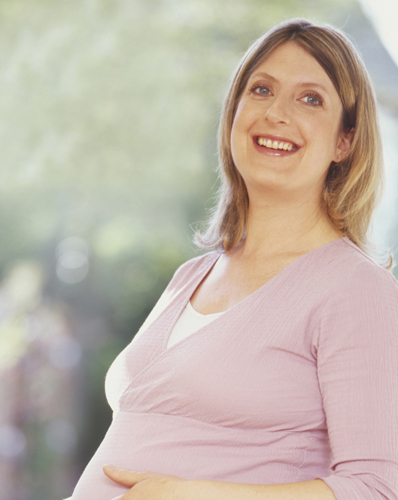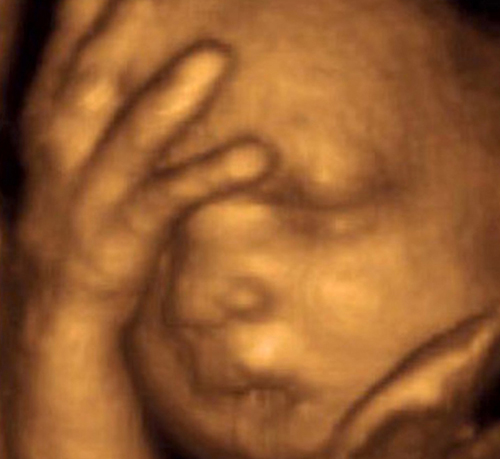You are 29 Weeks and 6 Days 71 days to go…
Your maximum blood volume won’t be reached for a few weeks yet, but your circulation is working harder than ever at this stage.
Your baby today
Increasingly sounds enter the uterus and your baby will respond
to some of the loudest. The fluid all around her can have quite an
effect on the sounds that your baby can hear: the effect is similar to
how you might feel when you swim with your head under water.

Your blood volume
is likely to be nearly a gallon and a half between weeks 25 and 35—an
increase of about 25 percent. This increased blood volume means that
your heart is pumping harder and faster. Your blood vessels are as
relaxed as they can be by this stage of pregnancy, and will not stretch
any further to accommodate this extra blood flow. You may notice that
you sweat more, and that your skin feels hotter (this is the rosy glow
that many women experience).
In addition to this
extra blood, there is also a lot more fluid circulating around your
body. This makes all your body tissues thicker. It’s common and normal
for your face, fingers, and ankles to be puffy or swollen . However, since puffiness is also a sign of preeclampsia, it’s important to have your doctor to check this out.
Your face shape may change this trimester as you retain more fluid and gain weight.

… Doctor
| Q: |
I’ve noticed that I get short of breath very easily. Should I be concerned?
|
| A: |
No, when you’re pregnant, your lungs have to work much harder
to meet your body’s increased oxygen needs. To help you take in more
air, your ribs spread sideways and your lung capacity increases
dramatically. This can make you feel breathless, particularly from
mid-pregnancy.
In the last three
months of pregnancy, most women find they get breathless even during
mild exertion, which happens as the expanding uterus pushes up against
the lungs. However, being breathless can also be a sign of anemia,
which may need to be treated. Your breathing may start to get easier
when your baby engages (moves down into your pelvis ready to be born)
(see When your baby drops).
|
… Twins
Exercising safely
If you’re pregnant with twins,
it’s recommended that you don’t do any vigorous or aerobic exercise in
the third trimester. The last three months are particularly tiring so
you probably won’t feel up to doing much anyway. You’ll also get bigger
sooner than someone who is having a single baby, and your size may
preclude you from doing certain activities.
If you do want to be
active, go for a gentle walk or swim, or to a pregnancy yoga or Pilates
class. If you want to do anything more vigorous than this in the third
trimester, check with your doctor first.
Your doctor will be
monitoring your babies’ progress and she may advise you on your level of
activity if there is any slowdown in the babies’ growth and
development.
Whatever activity you’re doing, always follow the guidelines for safe exercising .
You are 30 Weeks Exactly 70 days to go…
You probably won’t want to stop working just yet, but you may need to make some adjustments if you’re feeling very tired.
Your baby today
Does your baby start to feel tired? Certainly on some scans it
can look as if she is. In fact, your baby actually spends most of the
time in a state of sleep rather than full wakefulness: it seems that
during pregnancy your baby does need to spend most of the time asleep.

Later on in the third trimester
you may begin to feel more tired than usual. The strain on your body
may begin to show itself—you may find yourself uncomfortable and easily
fatigued. Things that never bothered you previously, such as standing
for long periods of time or walking a lot, may get increasingly
difficult. For example, your trip to and from work may tire you much
more than it did previously. If that is the case, find out whether you
can alter your hours to avoid traveling at the busiest times of the day
and, if you find yourself traveling during rush hours, don’t be shy
about asking someone to give up their seat on the train for you.
If there is a room in
which you can rest at work, you may be able to take a short nap in the
middle of the day or early afternoon, which might help to alleviate your
fatigue a little.
You may want to
discuss with your employer ways to make your job less physically
demanding, or ask for help, for example if you need to carry heavy files
or your job involves walking long distances. With a few adjustments you
should be able to keep going until the start of your maternity leave,
but above all, listen to your body: if you’re tired, rest; if your feet
and legs hurt, sit down.
Using a birthing pool
Laboring and giving birth in water
can not only relieve much of the pain, discomfort, and stress of
childbirth, it can also induce relaxation and reduce blood pressure.
Research shows that warm water on the lower back (the area of the spinal
cord that receives the nerves from the lower abdominal region) can
reduce labor pain, while the level of endorphins, or natural
painkillers, rises in the same environment. Whether you choose a
birthing pool or a warm bath, water is a great way to deal with
contractions.
If you give birth in
water, your baby’s umbilical cord will continue to provide her with the
oxygen she needs, but she will have to be brought to the surface quickly
to encourage her to breathe on her own.
Water birth should be done with your doctor’s supervision, and many birthing centers and hospitals now offer the option (see … Doctor). Make sure you include these details on your birth plan (see Making a birth plan). Using a birthing pool will not be recommended if your birth is considered to be high risk.
A growing number of hospitals
and birthing centers offer birthing pools. If you’d like to have a
water delivery, check the availability of a pool at your hospital when
you tour the facility.

… Twins
Cesarean birth
You’re more likely to deliver twins by cesarean than a single baby .
Many of these are elective: the decision is made in advance, and the
mother doesn’t go into labor. A cesarean is major surgery, but for the
babies it’s often the best way to arrive and a small price to pay for
the mother.
Vaginal birth can
be complicated for twins, especially the second twin who goes through
two rounds of uterine contractions. It’s considered high-risk if the
babies are premature.